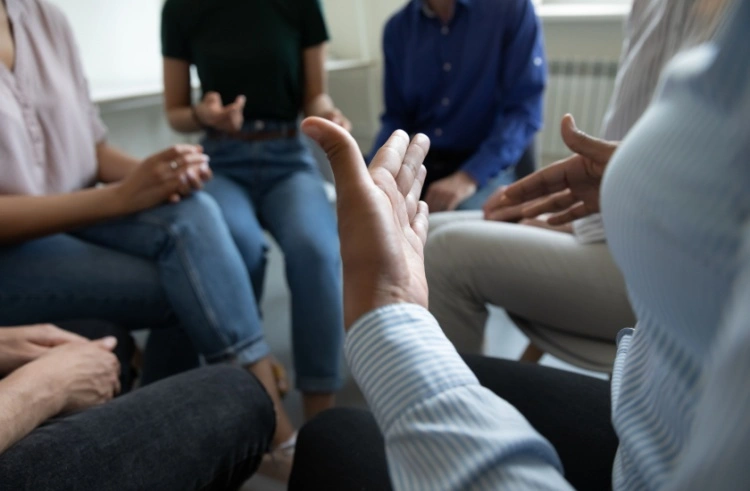How Mental Health Treatment Works
Mental health treatment is available for people with mental health issues, such as anxiety and depression.
There are many types of mental health treatments. Here’s how it typically works:
- Contact a general practitioner when you start developing mental health symptoms.
- Next, you will be referred to a provider who can provide psychological treatments or therapies. Also known as counseling, psychological therapies help by giving patients a chance to talk about their feelings and thoughts with a professional to understand and cope with their symptoms. Counseling can be done individually or in group settings.
- Healthcare providers may also prescribe medications, especially if your mental health symptoms are significantly affecting your life.
Mental health treatment plans differ depending on your condition(s) and other factors.
You can book an appointment with a mental health treatment provider, such as Mark Behavioral Health, to learn more about your next steps.
We offer various residential mental health services, including crisis stabilization, a trauma-informed care approach, group therapy, and more.
Mental Health Programs at Mark Behavioral Health
Mark Behavioral Health provides one program type: Residential Mental Health Treatment.
Residential Mental Health Care
Residential mental health care is the most intensive type of treatment. It requires you to check into a residential facility.
It is typically for mental health patients who live in unsafe homes, have serious behavior problems, or whose mental health is suffering to the point that they can’t function in daily life.
Residential treatment is best when outpatient services are inadequate or unsuitable for a patient’s needs.
Mental Health Treatment Services
Mark Behavioral Health provides a wide range of residential treatment services to offer a well-rounded approach to care. These include the following.
Crisis Stabilization and De-escalation
Crisis stabilization and de-escalation are short-term psychosocial techniques for reducing potential damage to a person affected by a crisis. Crises are overwhelming events such as violence, divorce, the discovery of a severe illness, or the passing of a family member.
Trauma-Informed Care Approach
Trauma-informed care (TIC) is a human service approach that assumes a person is more likely than not to have a history of trauma.
TIC embraces recovery and healing environments rather than services and practices that could inadvertently re-traumatize.
One-on-One Therapy
One-on-one therapy involves a licensed mental health professional and a patient. The goals of psychotherapy are relief from symptoms, improved quality of life, and maintenance of daily functioning.
You may want one-on-one therapy if you want a closer relationship with a mental health professional or your mental health issue is highly personal (i.e., it revolves around an issue that happened in childhood that you can’t or don’t want to talk to others about).
Family Therapy
Family therapy helps family members support each other, better understand each other, and deal with challenging situations.
This type of therapy can help a wide range of family members, including brothers and sisters, parents and children, cousins, aunts and uncles, partners, caregivers, and other professionals who are close to a family member or members.
Group Therapy
Group therapy is when one or two therapists work with several clients simultaneously.
Therapy or peer support groups typically have at least 12 members and meet for one to two hours weekly. The support group leaders and members sit in a way that lets each person see everyone else, such as in a circle.
Dialectical Behavior Therapy
Dialectical behavior therapy (DBT) is an evidence-based therapy model that helps people learn and use new strategies and skills to build lives they love.
It involves teaching patients two strategies: acceptance and change. Acceptance teaches patients that their behaviors and experiences are valid, while change teaches them that they must make changes to regulate their emotions and move forward.
Cognitive Behavioral Therapy
Cognitive behavioral therapy (CBT) is an evidence-based treatment that is effective for depression, alcohol and drug issues, eating disorders, anxiety disorders, and other mental health issues.
Numerous studies have shown that CBT can lead to significant improvements in quality of life and functioning. In some cases, CBT can be as effective or more effective than psychiatric medications and other types of psychological therapy.
Sexual Abuse Therapy
Sexual abuse therapy helps people who have experienced sexual assault and abuse.
There are several types of evidence-based sexual abuse therapy:
- Psychodynamic psychotherapy focuses on interpersonal relationships, encourages you to talk about past experiences, and explores attempts to avoid aspects of previous experiences.
- Trauma-focused cognitive behavioral therapy (TF-CBT) is a resilience-building model for adolescents and children and their parents and caregivers. It builds on the tenets of CBT for healing from trauma.
- Eye movement desensitization and reprocessing (EMDR) is used to alleviate distress caused by traumatic memories. The therapist performs EMDR by moving their fingers back and forth in front of you and getting you to follow the fingers with your eyes.
Grief Therapy
Grief therapy helps you through the grieving process after a major loss. It is also known as bereavement counseling when helping someone dealing with the loss of a loved one.
Here’s what grief therapy could include:
- Encouraging you to express all of your feelings
- Learning about grief and what to expect during the grieving process
- Helping you develop a new sense of self after a loss
Psychoeducation
Psychoeducation is a standard therapy program for people with schizophrenia.
It aims to empower patients and their families by teaching them about schizophrenia and the available treatment options.
Nutritional Counseling
Nutritional counseling is a supportive process in which a nutrition expert or dietician provides tailored dietary guidance. This treatment aims to help people plan healthy meals and build a healthier and more balanced lifestyle.
Nutrition counseling is helpful when anxiety, depression, and medical treatments (including antidepressants) for treating such disorders lead to unhealthy eating habits, causing nutritional imbalance or weight problems.
Types of Mental Health Issues Treated at Mark Behavioral Health
Mark Behavioral Health treats a wide range of mental health issues.
These include:
- Depression or depressive disorders occur when you feel depressed and lose interest in activities for long periods.
- Anxiety disorders cause people to avoid situations that worsen or trigger their feelings of anxiety.
- Attention-deficit/hyperactivity disorder (ADHD) can make it difficult to control impulsive behaviors and pay attention.
- Bipolar disorder causes extreme mood swings. Highs are called mania or hypomania and lows are called depression.
- Mood disorders are a mental health class that professionals use to describe all bipolar disorders and depression.
- Personality disorders occur when people have a lifelong pattern of reacting to others and seeing themselves in ways that cause issues.
- Panic disorders cause unexpected and frequent panic attacks.
Talk to us today to learn how our dual diagnosis programs can improve your well-being.
How Treatment Addresses Mental Health Symptoms
Mental health treatment programs address all mental health symptoms.
Common warning signs of mental health conditions include:
- Feeling down or sad
- Reduced ability to concentrate and confused thinking
- Low energy, tiredness, and sleeping issues
- Inability to cope with stress and daily problems
- Hallucinations, paranoia, and detachment from reality
What Types of Patients Do We Treat?
At Mark Behavioral Health, we treat adults with severe health issues, mainly in Florida, who do not have a primary need for substance abuse issues or eating disorders.
If you face these issues, you can still find treatment at Mark Behavioral Health. We partner with local facilities to give our patients well-rounded care.
How Many People Need Mental Health Treatment in Florida?
According to Forbes, Florida scores 81.4 out of 100 for mental health, tying with Georgia for having the second-highest percentage of adults with mental illnesses who did not receive treatment in the previous year (63.5%).
Florida is also home to the sixth-highest percentage of uninsured adults with mental health challenges (17.8%).
That’s where Mark Behavioral Health comes in. Our compassionate and knowledgeable staff work tirelessly to ensure that Floridians get the mental health treatment they deserve. Contact us today to learn more about how we can help.
Long-Term Effects of Untreated Mental Health Disorders
Untreated mental health disorders can have many long-term effects.
These include:
- Substance abuse: People with mental health disorders may turn to drugs and alcohol to numb their symptoms, leading to opioid and other kinds of drug addiction.
- Under and unemployment: Mental health patients may find managing their symptoms increasingly complex, leading to under and unemployment.
- Homelessness: People with mental health challenges who struggle with maintaining employment may become homeless.
- Incarceration: People with mental health challenges may be inappropriately incarcerated when they react to a situation or individual due to their symptoms.
- Suicide: People with mental health disorders may commit suicide out of frustration with their low quality of life.
How Much Does Mental Health Treatment Cost in Florida?
Mental health treatment fees in Florida vary depending on the following factors:
- Program type: Inpatient programs tend to cost more, while outpatient programs tend to be more affordable.
- Facility: Larger facilities with more resources may cost more than smaller ones with fewer resources.
- Insurance plan: Depending on your insurance plan, your mental health treatment may or may not be covered. Talk to your insurer to see whether you’re covered.
The average daily cost for residential mental health treatment in South Florida falls between $600 and $1,000. Outpatient services tend to cost less.
If you’re interested in getting mental health treatment through Mark Behavioral Health, contact us today. We work with patients and their families to find payment solutions so more people can access the mental health care they need.
Begin Your Journey to Mental Health Recovery Today
Getting mental health care can be the most important decision you make for your life. And choosing the right facility is crucial to getting the care you need.
Fortunately, Mark Behavioral Health is here to help. Our advocates will listen to your story and work with you and your loved ones to find the best treatment plan for your needs.
Reach out for a consultation today to learn more about how we can help.


